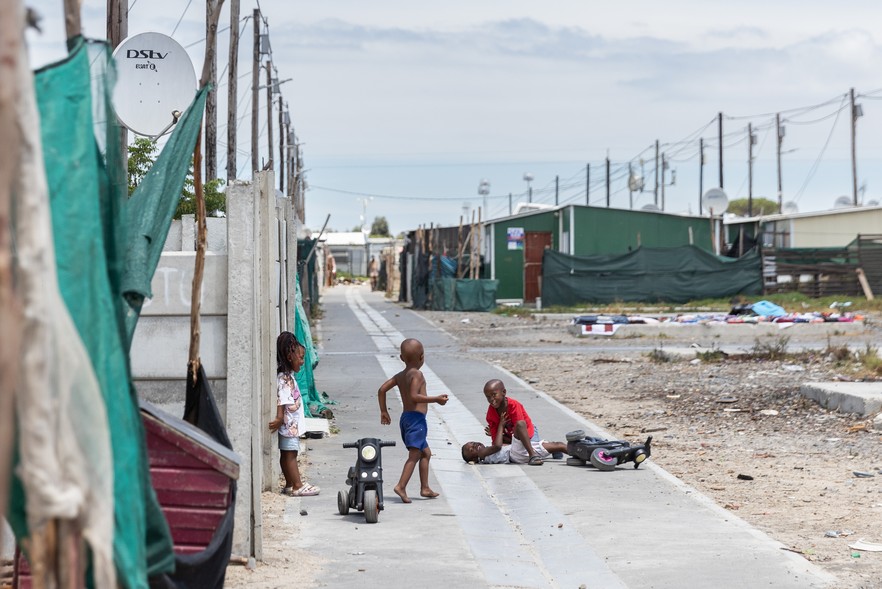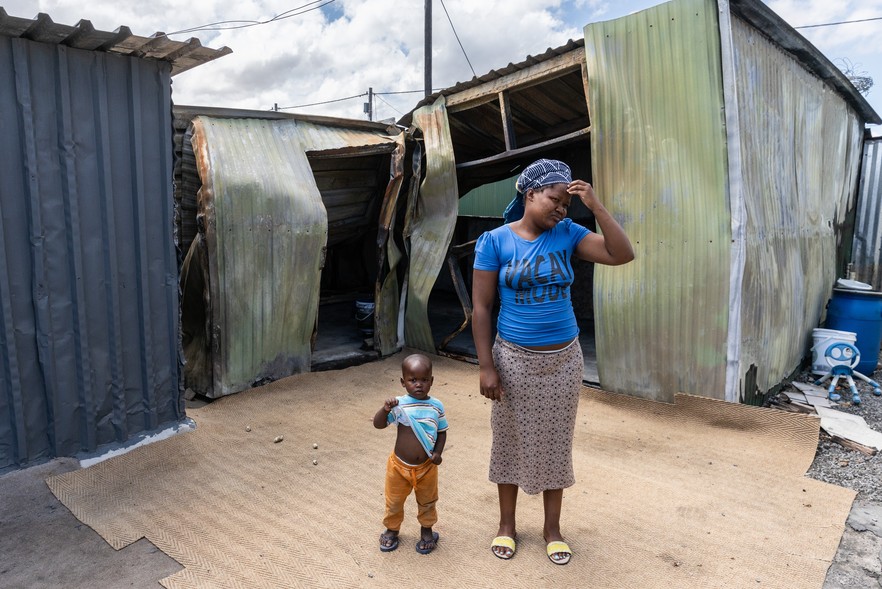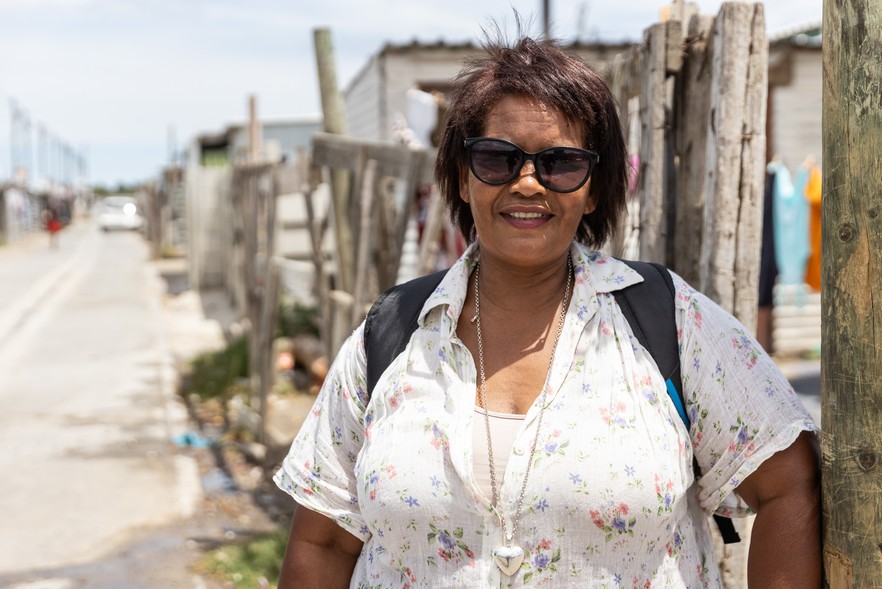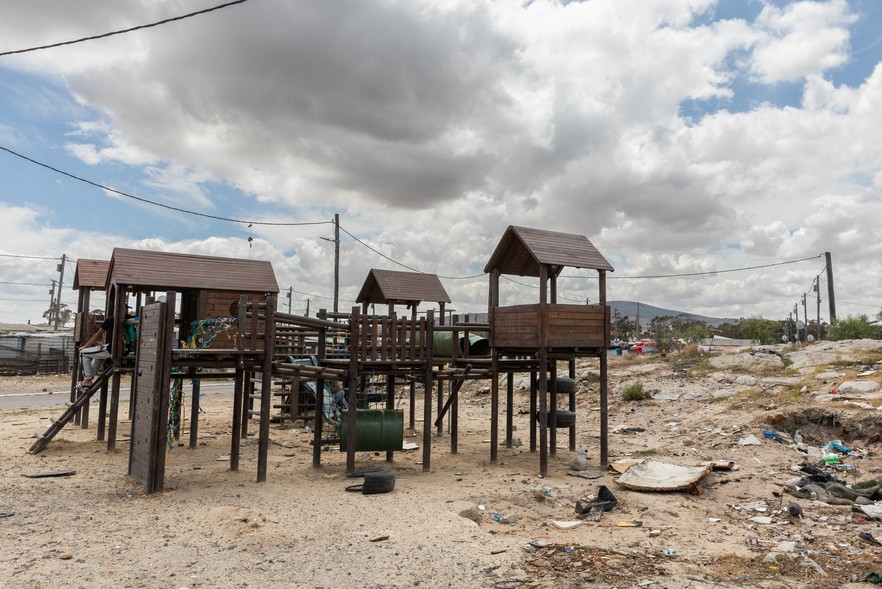Nine years later, here is how Wolwerivier is doing
Residents of the City’s emergency housing development face unemployment, extreme heat, and overcrowding. But “we have achieved a lot” says a community member
Children playing in the streets of Wolwerivier, about 30 kilometres from Cape Town’s city centre. The community, first set up as emergency housing by the municipality, has been plagued by overcrowding, high unemployment and challenges with accessing all public transport. Photos: Ashraf Hendricks
Life in one of Cape Town’s emergency housing sites on the outskirts of the city has been grim for the hundreds of people living there. The community endures overcrowding, high unemployment, difficulty accessing public transport and overwhelming heat during the summer months.
“Transport plays a big role in the unemployment problem,” said ward committee member Lu-Anne Dodgen. There are no buses like MyCiTi or Golden Arrow that run through Wolwerivier. There is a taxi that takes people to Dunoon or Melkbosstrand from Wolwerivier. If you need to be somewhere urgent, you can pay up to R300 for private transport.
The settlement is also expanding. At the entrance, new zinc shacks have been erected. “Those people have nowhere to go,” explains Dodgen.
She said that many of the younger people who had moved there with their parents nearly nine years ago, are now grown up and starting their own families in Wolwerivier. “Children, parents, and grandparents are all living in the same house.”
The settlement of Wolwerivier was established by the City of Cape Town in 2015 with about 336 houses for families being relocated from informal settlements, including the nearby Skandaalkamp.
The homes have water, sanitation, electricity and there are some services including a creche, and a mobile clinic. Tar roads have also been built since GroundUp visited the settlement last in 2021.
In December a fire destroyed eight homes as well as the spaza shop. Bongeka Dakwini, who has lived in Wolwerivier since 2018, lost her house and all of her belongings in the fire while she was on holiday in the Eastern Cape. “If I was here, I could’ve removed the important things,” she said.
Bongeka Dakwini with her son Mikhulu Sesona, 2, stands in front of the family home that burnt down, along with seven other homes, in December. She is unemployed and says it is expensive for her to travel out of the area to look for work and collect her children’s grants.
She has since erected another structure from materials donated by her neighbours. She lives with her partner and two young children. They don’t yet have access to electricity.
Dakwini is unemployed and still looking for a job. They survive on her children’s R510 Child Support grants. When she travels to Cape Town to collect the grants via taxi, it costs R17 to get to Dunoon and another R21 to get from Dunoon to Cape Town — a total of R76 for a round-trip.
Magdalene Minnaar, one of the original residents, said that they are grateful for the tar roads but it does increase the temperature in the settlement on hot days. “The heat is unbearable. You can’t even sleep in the evening … You are here most of the day. It’s not nice to live like we do,” she said.
Minnaar said that a few trees “would help a bit” and also if the houses were further apart to allow for some wind clearance.
Minnaar said that things are “even worse” than when the settlement first started. More teenagers were getting pregnant and school dropouts among the youth were also increasing. “I think it’s because of education. Someone needs to take the lead and educate people on family planning,” she said.
While kids often play at the community centre after school, there are no other after-school extracurricular sports or educational activities.
Magdalene Minnaar was among the first families to be relocated to Wolwerivier years ago. She worries about the slow pace of development and opportunities for residents.
City of Cape Town Mayco member for Human Settlements Carl Pophaim said that the “registration of Wolwerivier beneficiaries was tightly controlled” and that larger families who applied received two units instead of one.
“The original development was designed with sufficient space to accommodate the families, including the larger families,” he said. He said that some people have also unlawfully done extensions and rented out their units.
He said that the City is also acting on “unlawful occupations” when it takes place.
Wolwerivier was originally intended to be a temporary development. It’s clear though that it has become permanent. But it’s unclear how the City intends to develop it further and Pophaim’s response to our questions didn’t shed light on future plans.
Jonty Cogger, attorney at housing activist organisation Ndifuna Ukwazi, said that the City has “allowed [residents] to continue in this state of hiatus”.
Cogger said that new developments like a creche and a community centre have since been started but that the problem is still access as Wolwerivier is somewhat isolated from urban neighbouring communities.
Minnaar said that they’ve recently started a neighbourhood watch, which they’re still in the process of registering to curb crime such as robberies. She is also hosting adult cooking lessons with 30 parents on how to cook cheap and healthy meals, along with frequent baking classes which GroundUp reported on in 2021.
“We’ve achieved a lot as well, on our own as a community,” said Minnaar.
Wolwerivier’s play park has been vandalised and there is litter everywhere.
Next: Worker who earns R3,500 per month spends R1,200 on transport
Previous: Historic Eastern Cape town hall which burned down a year ago still hasn’t been repaired
© 2024 GroundUp. This article is licensed under a Creative Commons Attribution-NoDerivatives 4.0 International License.
You may republish this article, so long as you credit the authors and GroundUp, and do not change the text. Please include a link back to the original article.
We put an invisible pixel in the article so that we can count traffic to republishers. All analytics tools are solely on our servers. We do not give our logs to any third party. Logs are deleted after two weeks. We do not use any IP address identifying information except to count regional traffic. We are solely interested in counting hits, not tracking users. If you republish, please do not delete the invisible pixel.






